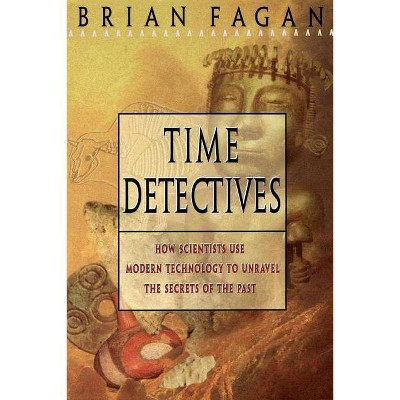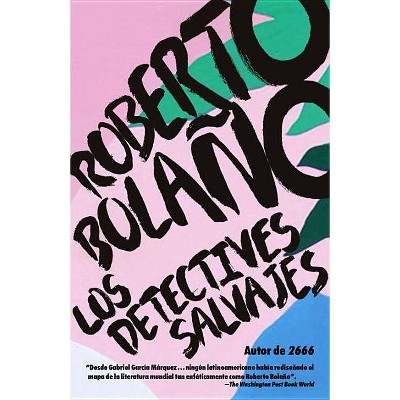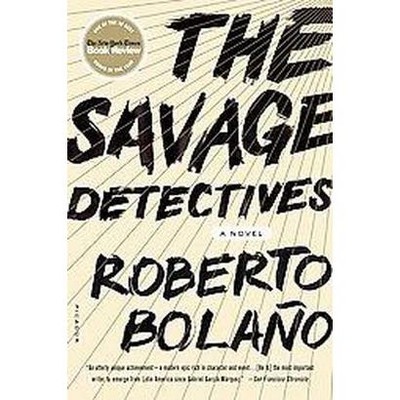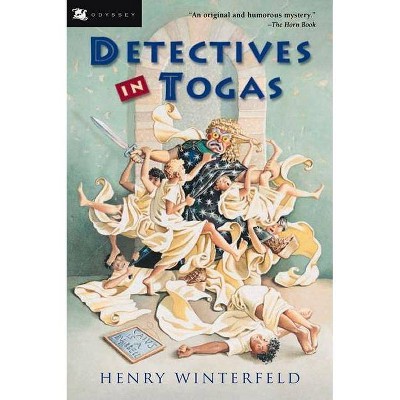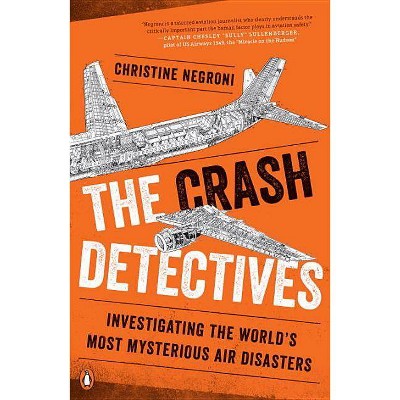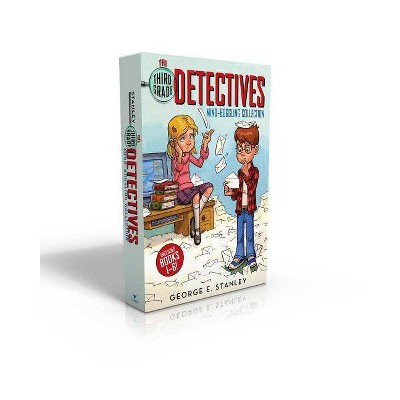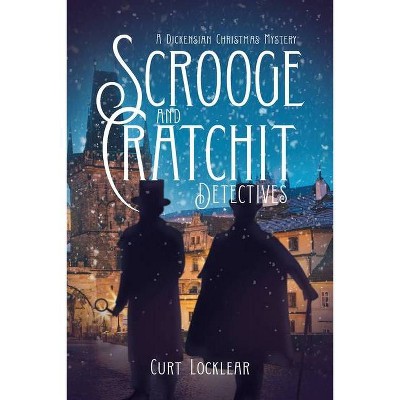Starlight Detectives - by Alan Hirshfeld (Paperback)
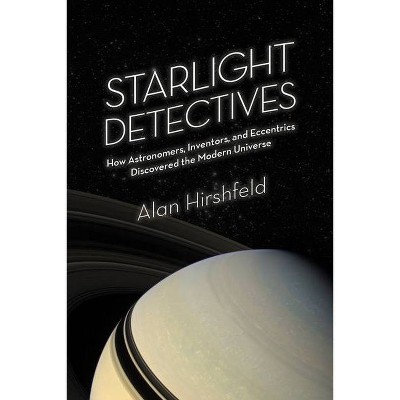
Similar Products
Products of same category from the store
AllProduct info
<p/><br></br><p><b> About the Book </b></p></br></br>A wondrous tale of cosmic exploration and the colorful characters who ushered astronomy into the modern age<p/><br></br><p><b> Book Synopsis </b></p></br></br><b> Julia Ward Howe Award Finalist </b><br><b>NBC News "Top Science and Tech Books of the Year" selection</b><br><b><i>Scientific American</i>/FSG "Favorite Science Books of the Year" selection</b><br><b>Nature.com "Top Reads of the Year" selection</b><br><b><i>Kirkus Reviews</i> "Best Books of the Year" selection</b><br><b><i>Discover</i> magazine "Top 5 Summer Read"</b> <p/>"A masterful balance of science, history and rich narrative." --<i><b>Discover</i> magazine</b> <p/>"Hirshfeld tells this climactic discovery of the expanding universe with great verve and sweep, as befits a story whose scope, characters and import leave most fiction far behind." --<b><i>Wall Street Journal</i></b> <p/>"<i>Starlight Detectives</i> is just the sort of richly veined book I love to read--full of scientific history and discoveries, peopled by real heroes and rogues, and told with absolute authority. Alan Hirshfeld's wide, deep knowledge of astronomy arises not only from the most careful scholarship, but also from the years he's spent at the telescope, posing his own questions to the stars." --<b>DAVA SOBEL</b>, author of <i>A More Perfect Heaven: How Copernicus Revolutionized the Cosmos</i> and <i>Longitude</i> <p/>In 1929, Edwin Hubble announced the greatest discovery in the history of astronomy since Galileo first turned a telescope to the heavens. The galaxies, previously believed to float serenely in the void, are in fact hurtling apart at an incredible speed: the universe is expanding. This stunning discovery was the culmination of a decades-long arc of scientific and technical advancement. In its shadow lies an untold, yet equally fascinating, backstory whose cast of characters illuminates the gritty, hard-won nature of scientific progress. <p/>The path to a broader mode of cosmic observation was blazed by a cadre of nineteenth-century amateur astronomers and inventors, galvanized by the advent of photography, spectral analysis, and innovative technology to create the entirely new field of astrophysics. From William Bond, who turned his home into a functional observatory, to John and Henry Draper, a father and son team who were trailblazers of astrophotography and spectroscopy, to geniuses of invention such as Léon Foucault, and George Hale, who founded the Mount Wilson Observatory, Hirshfeld reveals the incredible stories--and the ambitious dreamers--behind the birth of modern astronomy. <p/><b>Alan Hirshfeld</b>, Professor of Physics at the University of Massachusetts Dartmouth and an Associate of the Harvard College Observatory, is the author of <i>Parallax: The Race to Measure the Cosmos, The Electric Life of Michael Faraday, </i> and <i>Eureka Man: The Life and Legacy of Archimedes.</i><br><p/><br></br><p><b> Review Quotes </b></p></br></br><br><strong> Julia Ward Howe Award Finalist </strong><br><strong>NBC News "Top Science and Tech Books of the Year" selection</strong><br><strong><em>Scientific American</em>/FSG "Favorite Science Books of the Year" selection</strong><br><strong>Nature.com "Top Reads of the Year" selection</strong><br><strong><em>Kirkus Reviews</em> "Best Books of the Year" selection</strong><br><strong><em>Discover</em> magazine "Top 5 Summer Read"</strong> <p/>"A masterful balance of science, history and rich narrative." --<em><strong>Discover</em> magazine</strong> <p/>"Astrophysicist Hirshfeld chronicles the radical changes in our conception of the cosmos." --<strong><em>Scientific American</em> (recommended feature review)</strong> <p/>"Tales of pioneering skywatchers and their discoveries in the 19th century show how modern astronomy was born." --<strong><em>Science News</em></strong> <p/>"Hirshfeld tells this climactic discovery of the expanding universe with great verve and sweep, as befits a story whose scope, characters and import leave most fiction far behind." --<strong><em>Wall Street Journal</em></strong> <p/>"Even today, amateurs trade images over the Internet that professional astronomers incorporate into their work. This abundant crossplay informs <em>Starlight Detectives</em> . . . Author Alan Hirshfeld explains how 'the human eye itself was a fundamental roadblock to progress' and how the heroes are the ones who made higher-quality telescopes and photographs. Those who applied substances like collodion, and then gelatin, to create crisper photographic negatives, are key here. And because of mounting technological advances, our era boasts great gains and great excitement. Hirshfeld sums it up: 'The classical astronomer's question, 'Where is a star?' evolved into the astrophysicist's more profound inquiry, 'What is a star?'" --<strong><em>Boston Globe</em></strong> <p/>"Th[e] race to see deep space is told with palpable relish. . . . No less rousing is Hirshfeld's rendition of the coda, as Edwin Hubble--using the 2.5-metre reflector telescope at Mount Wilson, California--discovered the expansion of the Universe and opened up the cosmos." --<strong><em>Nature: International Weekly Journal of Science</em></strong> <p/>"A tour-de-force. . . . Eminently well written, the story lines immerse the reader in situations and events that provide real insight into the roles of numerous amateur (here meaning not formally trained) astronomers in moving the field forward, as well as how professional astronomers have worked with amateurs to the advantage of both. Hirshfeld's writing style brings the 19th century back to life and provides a rich tapestry of astronomical history." --<strong><em>American Journal of Physics</em></strong> <p/>"Wonderfully describes this era of astronomical innovation. . . . [Hirshfeld] paints vivid portraits of the people, both professionals and amateurs, in Europe and the United States who drove th[e] shift from basic observational astronomy to more advanced astrophysics." --<strong><em>Space Review</em></strong> <p/>"Fascinating. . . . <em>Starlight Detectives</em> is the story of an astronomical upheaval as profound as the Copernican revolution." --<strong><em>Planetary Society</em></strong> <p/>"An enjoyable and informative contribution to the history of astrophysics. . . . [Hirshfeld] is a fine writer not only in the macro sense--his overall tale is a compelling one--but also in the micro sense--he writes terrific sentences, sometimes slyly witty, sometimes filled with interesting metaphors." --<strong><em>International Astronomical Union</em></strong> <p/>"Highly illuminating. . . . A delightful, detailed chronicle of great men (and a rare woman) whose fascination with the night sky and the technology necessary to study it led to today's dramatic discoveries." --<strong><em>Kirkus Reviews</em> (starred review)</strong> <p/>"This comprehensive rundown of the great names in astronomical detection makes for compelling biographical reading. . . . Every researcher presented in this book is as lively in the text as if they were still personally scouring the heavens." --<strong><em>Foreword Reviews</em> (5-star review)</strong> <p/>"A well-written and enjoyable title for astronomers--professional and amateur alike--as well as science history fans." --<strong><em>Library Journal</em></strong> <p/>"Reveal[s] the persistence and imagination required for scientific progress." --<strong><em>Princeton Alumni Weekly</em></strong> <p/>"Beautifully written, <em>Starlight Detectives</em> reminds us how the wonders of the modern universe would never have been possible without the ingenious advances made by pioneering scientists in the nineteenth century. They were the ones who first learned how to read the messages hidden within a star's radiations. With his poetic eye on the nighttime sky, Alan Hirshfeld engagingly shows how science arrived, step by step, at its revolutionary discovery that we live in but one galaxy amid multitudes flying outward in an expanding universe. A must-read for astronomy and history of science aficionados alike." --<strong>MARCIA BARTUSIAK</strong>, author of <em>The Day We Found the Universe</em> and <em>Archives of the Universe</em> <p/>"Hirshfeld documents how the practice of astronomy changed between 1840 and 1940 thanks to innovative pioneers whose efforts made it possible to capture and preserve otherwise faint and fleeting images, and to decipher the cryptographic messages found in the light of celestial bodies. His riveting narrative brings to life their challenges, failures, and successes. It will captivate all who have observed the night sky." --<strong>BARBARA J. BECKER</strong>, author of <em>Unravelling Starlight: William and Margaret Huggins and the Rise of the New Astronomy</em> <p/>"Writing this book would ideally require an author with an extensive knowledge of astronomy, including astronomical instruments, a deep understanding of the ways of thought of astronomers, a broad range of historical knowledge, and an exceptional skill at making astronomical ideas clear and engaging. Alan Hirshfeld possesses all of these skills. His <em>Starlight Detectives</em> is remarkable." --<strong>MICHAEL J. CROWE</strong>, author of <em>The Extraterrestrial Life Debate, 1750-1900</em> <p/>"A thrilling historical account of the rise of astrophysics, the early years of astronomical photography and spectroscopy, and the innovations that transformed the astronomical telescope in the nineteenth century. Alan Hirshfeld's thoroughly researched narrative is accessible, entertaining, and scholarly, and includes many pioneers who have been overlooked until now. I greatly admire this outstanding contribution to the history of astronomy." --<strong>SIMON MITTON</strong>, co-author of <em>Heart of Darkness: Unraveling the Mysteries of the Invisible Universe</em> and author of <em>Fred Hoyle: A Life in Science</em> <p/>"<em>Starlight Detectives</em> is just the sort of richly veined book I love to read--full of scientific history and discoveries, peopled by real heroes and rogues, and told with absolute authority. Alan Hirshfeld's wide, deep knowledge of astronomy arises not only from the most careful scholarship, but also from the years he's spent at the telescope, posing his own questions to the stars." --<strong>DAVA SOBEL</strong>, author of <em>A More Perfect Heaven: How Copernicus Revolutionized the Cosmos</em> and <em>Longitude</em><br><br><p/><br></br><p><b> About the Author </b></p></br></br><b>Alan Hirshfeld</b>, Professor of Physics at the University of Massachusetts Dartmouth and an Associate of the Harvard College Observatory, received his undergraduate degree in astrophysics from Princeton and his Ph.D. in astronomy from Yale. He is the author of <i>Parallax: The Race to Measure the Cosmos, The Electric Life of Michael Faraday</i>, and <i>Eureka Man: The Life and Legacy of Archimedes</i>. He is a regular book reviewer for the <i>Wall Street Journal</i> and has contributed to <i>Sky & Telescope</i>, the <i>American Journal of Physics, BBC History Magazine</i>, and American Scientist</i>. He has made radio and television appearances on NPR, PBS, and C-SPAN and lectures nationwide about science history and discovery.
Price History
Price Archive shows prices from various stores, lets you see history and find the cheapest. There is no actual sale on the website. For all support, inquiry and suggestion messagescommunication@pricearchive.us
